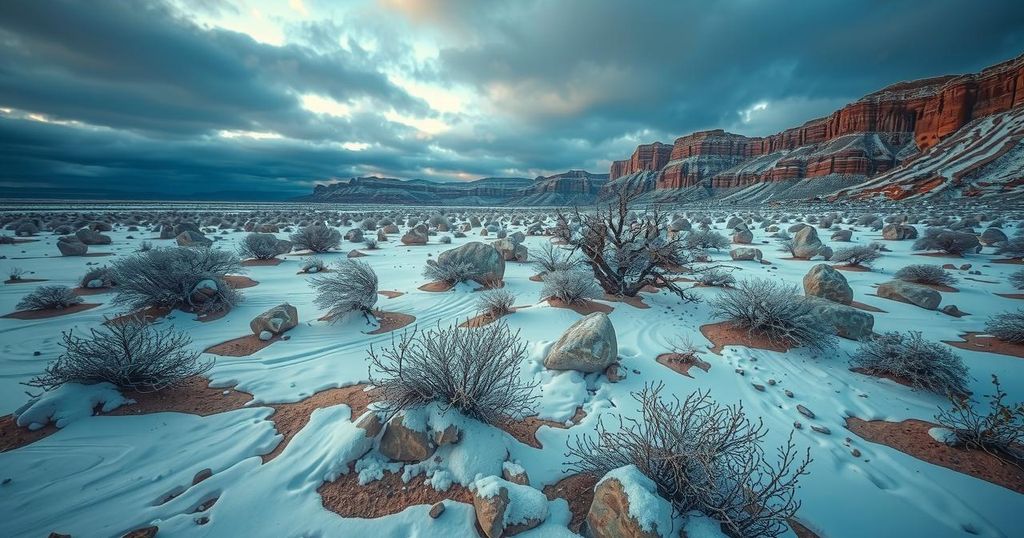The Al-Jawf region of Saudi Arabia recently experienced unprecedented snowfall and heavy rains, contrasting its usual arid climate. While this may benefit agriculture in the short term, climate experts express concern about the implications of erratic weather patterns driven by climate change. The situation raises awareness of potential agricultural droughts and economic losses in the future, emphasizing the need for preparation and adaptation in the face of global warming.
The Al-Jawf region of Saudi Arabia has recently witnessed an unusual meteorological phenomenon, experiencing heavy rains and snowfall. This stunning natural occurrence, which contrasts with the region’s typically arid landscape, has sparked enthusiasm on social media, showcasing images of snowy vistas and rushing waterfalls. However, experts suggest that this sudden climate shift may signal deeper environmental issues driven by climate change, prompting a discussion about the region’s future agricultural potential and risks. Traditionally known for its moderate climate and fertile land, Al-Jawf produces a significant portion of the Kingdom’s wheat and olive oil. Unlike Tabuk, which regularly experiences snowfall due to its elevation, Al-Jawf’s recent weather patterns raise questions about the implications of such changes in an otherwise dry environment. The Saudi Press Agency attributes the snowfall to a low-pressure system from the Arabian Sea, reflecting broader patterns of unusual weather in the region. Climate experts warn that rising global temperatures are likely to increase the frequency of intense rainfall, potentially leading to detrimental agricultural droughts and desertification. Saudi Arabia is particularly vulnerable, with projections indicating that the country may lose significant portions of its GDP by 2050 if aggressive climate action is not adopted. Despite the current benefits of enhanced moisture for crops, the underlying concerns about climate change remain pressing. While the recent snowfall may improve spring conditions for agriculture in Al-Jawf, caution is advised as heavy rains and severe weather are forecasted to continue. The National Centre of Meteorology (NCM) has warned of possible thunderstorms and strong winds, advising residents to take appropriate precautions. As West Asia experiences an increase in unpredictable weather patterns, the regions must prepare for ongoing challenges associated with climate change.
The article discusses the unprecedented weather phenomenon of snowfall in the Al-Jawf region of Saudi Arabia, typically characterized by its arid climate. This occurrence is brought about by a low-pressure system from the Arabian Sea, highlighting the connection between changing weather patterns and climate change. Researchers have expressed concerns about the rising global temperatures resulting in more extreme weather events in the region, impacting both agriculture and economic stability. The juxtaposition of this beautiful scene with the potential for future agricultural challenges provides a comprehensive look at the implications of climate change in an area not traditionally known for snow.
In summary, the snowfall in Al-Jawf presents both a moment of beauty and a reminder of the pressing realities of climate change. While it temporarily enhances agricultural prospects for the spring season, experts caution against the larger implications of increasing extreme weather events. It is essential for the Kingdom to assess and adapt to these changes to protect its agricultural sector and economic future amidst the challenges posed by climate change.
Original Source: www.outlookbusiness.com






